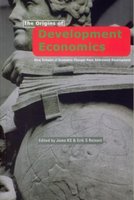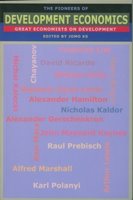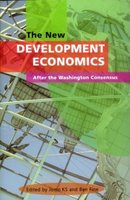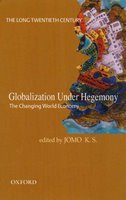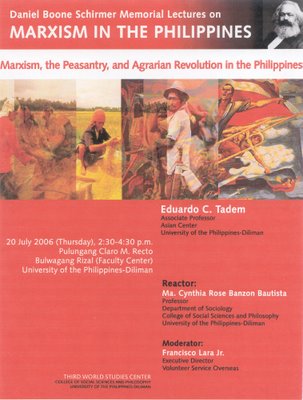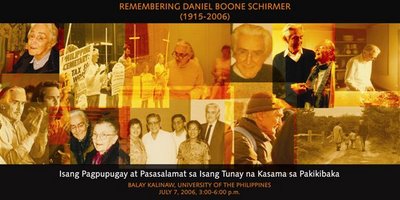The data and insights in this brief are based, in whole or in part, from the proceedings of the forum on Human Security and Governance (Balay Kalinaw, University of the Philippines, Diliman, 25 July 2006), the second installment in the Third World Studies Center’s Policy Dialogue Series 2006: Towards a Human Security Framework. This brief was prepared by Zuraida Mae D. Cabilo, University Research Associate, Third World Studies Center, University of the Philippines-Diliman and Project Coordinator of the TWSC Policy Dialogue Series 2006.
Human Security, Participation, and the Local Government Code of 1991The post-EDSA democratization process is characterized by an increased participation of civil society organizations (CSOs) in governance. This provided the impetus for the decentralization project, which seeks to enhance further the capacities of both government and nongovernment actors as participants in the local development process. In the Philippines, the Local Government Code (LGC) of 1991 enshrines the governance framework of decentralization to strengthen the role of local governments in contributing to the goal of national development. It institutionalizes state-civil society relations. Section 28 of the Code specifically mandates the representation of nongovernment organizations (NGOs) in decision-making processes in the provincial, municipal, and city levels. The law likewise provides for mechanisms to facilitate participation. Levels of participation, particularly in the local level, vary from local initiatives, referendum, to representation of NGOs and people’s organizations (POs) in local development councils and bodies.
The forum was attended by representatives from local government units (LGUs), CSOs, and the academe in an attempt to facilitate the sharing of knowledge and experience on how “best practices” in local governance promote and protect human security, particularly of marginalized sectors. Questions on the governance-human security nexus were addressed, focusing on the Local Government Code of 1991 to see how existing structures and processes can be strengthened further to ensure meaningful participation, especially of marginalized sectors in local governance.
The Local Government Code as a Tool to Ensure Human Security through Participation
Responsive and good governance as a means of ensuring human security entails not only the provision of basic social services to local constituencies. An equally important dimension is the opportunity for various development stakeholders, specifically the marginalized sectors, to play vital roles in local development processes. In a decentralized context where there is co-responsibility between governance institutions at the national and local levels (Work 2002 quoted in Mani 2005), enhancing the capabilities of both local government officials and civil society actors is given prime importance for two reasons. First, capability enhancement gives local officials and civil society participants the opportunity to understand and practice participatory processes in local development planning. Second, this enables CSOs to participate in local development processes and exact transparency and accountability from local executives. The LGC goes further than mere participation in policymaking processes; the Code upholds representation especially of underprivileged groups to make possible claim-making.
The existing policy environment is unambiguous in its bias for participation of various stakeholders, particularly of disadvantaged sectors, in decision-making processes that impact on local development. The National Integrated Protected Areas System law, Indigenous Peoples Rights Act, and the 1998 Agriculture and Fisheries Modernization Act are among many legislations that include participatory governance mechanisms. The LGC, however, contains the most innovative stipulation allowing for local sectoral representation. It facilitates and provides for mechanisms of civil society participation, particularly in the context of increased demands for transparency and accountability in local governance.
One mechanism in the Code is the inclusion of NGO representatives in the Local Development Council (Section 107b), which is tasked to chart the comprehensive multisectoral development plan. This provision, along with many others (Sec. 35, 106) not only recognizes NGOs and POs as partners but more importantly opens the decision-making process to civil society representatives of marginalized sectors. Sectoral representation is a means of ensuring that perspectives of various sectors are taken in to account in local legislations. Apart from a constitutional mandate for local sectoral representation (Art. 10, Sec. 9; Art. 18, Sec. 15-16), the LGC authorizes specifically for at least three representatives from the women sector, workers sector, and a third sector, which may be determined by the local legislative council (sanggunian) (Sections 41c, 446, 457, and 467).
While participation and representation is enshrined in the LGC, it remains unrealized in majority of LGUs. Concerns of marginalized sectors remain centered on human security threats. Local officials, who are primarily politicians instead of public servants, feed on the electorate’s desire for short-term solutions to community problems instead of investing in more sustainable and viable undertakings. The existing personality-based political culture in the Philippines is identified as the culprit in the failure of local government to respond to the needs of their more disadvantaged constituencies. This results to a mismatch of programs implemented and the needs of the communities. Exacerbating this is the incoherence and conflict between national and local policies. These myriad of factors, when put together, aggravate the insecurity of marginalized sectors despite provisions for representation.
Policy Proposals
The LGC as a framework affords flexibilities for LGUs to function. It is actually a matter of creativity of the local government officials to provide a whole range of options to its citizens. The democratic space and the existence of a vibrant civil society present a ripe context for genuine participation and representation to flourish. In response to the challenges posed by the existing political and electoral milieu, the passage of the Local Sectoral Representation (LSR) bill is being advocated continually. According to SALIGAN, an NGO and a consistent advocate of LSR, LSR seeks to introduce local governance reforms, politico-electoral reforms, and social reforms. The bill’s salient features include:
- Three seats reserved for marginalized sector in the local sanggunian, which is consistent with what the Philippine Constitution mandates. The proposed provision on the third sector, which may come from various sectors2, is that the inclusion of local sectoral representatives for 4th, 5th and 6th class municipalities shall not increase the number of seats in the sanggunian as presently provided for by law, unless an LGU passed a resolution stating that there are available funds for such additional seats.
- Organizations or coalitions, not individuals, are candidates for the sectoral representative seat.
- All registered voters are entitled to vote for each of the three positions reserved for the sectoral representatives.
- The seat of the elected sectoral representative shall be forfeited if s/he changes his/her organization affiliations during his/her term of office.
- The bill fills the seats reserved for sectoral representatives in case a permanent vacancy occurs. (SALIGAN 2006)
At present, the LGC only identifies the sectors that may be elected to the seat in the council and not how representatives will be elected. The Commission on Elections, thus, must issue a guideline for the election of sectoral representatives. However, Republic Act 7887 (amending the Synchronized Elections Law of 1991) implies that the issuance of said guidelines must be in accordance with an enabling law, which is yet to be enacted by Congress.
Another striking proposal is to align local and national government plans and programs. The conflict between the national and the local becomes more pronounced in cases where national government policies impinge on the territorial jurisdiction of local governments and adversely impact local communities. Section 3 (k) of the LGC stipulates that “[t]he realization of local autonomy shall be facilitated through improved coordination of national government policies and programs and extension of adequate technical and material assistance to less developed and deserving local government units.” While this plan alignment may be prescribed by law, reality shows that in majority of LGUs, national policies exercise supremacy over local ordinances.
In the few instances where local government has continuously asserted territorial, administrative, and management authority, it requires not only innovation and continuity but also the openness of local officials to recognize civil society actors as part of governance. Completing the devolution of services such as education facilitates the process for LGUs to be innovative. Citing the case of Naga City, Wilfredo Prilles Jr. related that the local government was able to respond to the needs of the education sector in the city through its local school board by working around with what the LGC provides, instead of waiting for the Department of Education in the national level to respond to their needs. Hiring and awarding of performance incentives were based on local mechanisms with its financial requirements drawn from the budget of the local government. Such practices and mechanisms are harnessed with the full delegation of authority at the local level.
Greater decentralization and participatory governance require overhauling existing political culture and practices. This includes the promotion of voting based on track record, which is made possible through voters’ education, inclusion of a standard of quality of service for aspirants, and support for management training for LGUs especially at the barangay level.
The role of civil society in instigating these changes becomes more emphasized. However, stress is placed on civil society to readily take the cudgels and incessantly exact accountability from local officials.
A third proposition is to elevate the standards for those running for public office. This electoral reform complements the proposal to improve the track record of candidates.
References
Local Government Code of 1991 (Republic Act 7160).
Mani, Devyani. 2005. Strengthening Decentralized Governance for Human Security. Paper presented in the UNDESA/UNCRD Workshop on Decentralization, Poverty Reduction, Empowerment and Participation, International Conference on Engaging Communities, 14-17 August, Brisbane, Australia. Accessed through http://unpan1.un.org/intradoc/groups/public/documents/UN/UNPAN021098.pdf on 13 June 2006.
SALIGAN. 2006. Local Sectoral Representation: Unfulfilled Mandate. Presented by Atty. Edna Maguigad during the Third World Studies Center Policy Dialogue Series 2006 on Human Security and Governance in 25 July 2006 at the Balay Kalinaw, University of the Philippines, Diliman, Quezon City.






